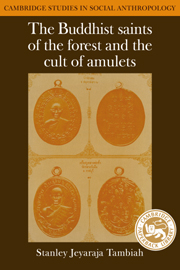Book contents
- Frontmatter
- Contents
- Acknowledgments
- Note on transcription
- 1 Introduction and manifesto
- Part I The arahant and the Path of Meditation
- Part II The hagiography of a Buddhist saint: text and context; the politics of sectarianism
- 6 The biography of a modern saint
- 7 The Buddha's life as paradigm
- 8 The ordering principles behind Buddhist saintly biography
- 9 The disciples of the Master
- 10 The biographer as exemplary forest-monk, meditator, and teacher
- 11 Sectarianism and the sponsorship of meditation
- 12 The Mahānikāi sect's propagation of lay meditation
- 13 The center–periphery dialectic: the Mahāthāt and Bovonniwet sponsorship of meditation compared
- Part III The cult of amulets: the objectification and transmission of charisma
- Part IV Conceptual and theoretical clarifications
- Notes
- Index
- CAMBRIDGE STUDIES IN SOCIAL ANTHROPOLOGY
11 - Sectarianism and the sponsorship of meditation
Published online by Cambridge University Press: 10 December 2009
- Frontmatter
- Contents
- Acknowledgments
- Note on transcription
- 1 Introduction and manifesto
- Part I The arahant and the Path of Meditation
- Part II The hagiography of a Buddhist saint: text and context; the politics of sectarianism
- 6 The biography of a modern saint
- 7 The Buddha's life as paradigm
- 8 The ordering principles behind Buddhist saintly biography
- 9 The disciples of the Master
- 10 The biographer as exemplary forest-monk, meditator, and teacher
- 11 Sectarianism and the sponsorship of meditation
- 12 The Mahānikāi sect's propagation of lay meditation
- 13 The center–periphery dialectic: the Mahāthāt and Bovonniwet sponsorship of meditation compared
- Part III The cult of amulets: the objectification and transmission of charisma
- Part IV Conceptual and theoretical clarifications
- Notes
- Index
- CAMBRIDGE STUDIES IN SOCIAL ANTHROPOLOGY
Summary
The royal road to Bangkok
The following criticisms and explanations of the phenomenon of forest teachers being acclaimed as arahant (saints), of the cult of amulets associated with them, comes from one of the best scholar monks in Thailand, who some years ago disrobed to become a layman. His criticisms have to be understood in the context of two considerations: He belonged to the Mahānikāi sect, and his sympathies were naturally with it with regard to its rivalry with the Thammayut sect; and he was a scholar monk who not only was most orthodox and correct in his observance of disciplinary rules, but also had a deep understanding of the philosophical and doctrinal principles of the Theravāda version of the Buddha's teachings.
This commentator, Mr. X, was contemptuous of the fact that a writer by the name of Sittachetavanna had claimed that there were a number of arahant – maybe about 100 – in Thailand today; Mr. X had written a scathing riposte to this claim, in which he pointed out that the arahant of olden days never pluksēk (chanted powerful words) as the modern ones do. (The commentator was referring here to the sacralization of amulets.)
Mr. X held up Acharn Chā of Ubon as an exemplary forest-monk and meditation teacher who did not engage in the low art of saiyasāt (“magic”). I have already given an account of Acharn Chā as a forest-monk teacher of the Mahānikāi sect and reported that he is acclaimed by many persons in Thailand as an exemplary teacher of meditation (see Chapter 9).
- Type
- Chapter
- Information
- The Buddhist Saints of the Forest and the Cult of Amulets , pp. 154 - 167Publisher: Cambridge University PressPrint publication year: 1984



